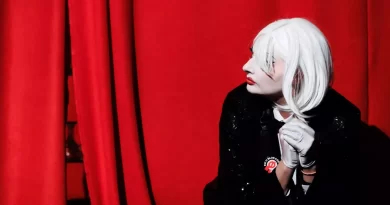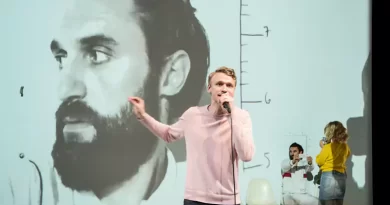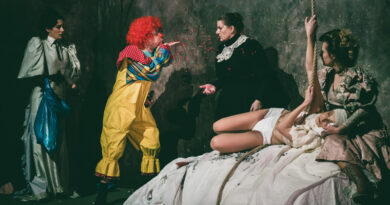Woodhill, Edinburgh Festival Fringe
Summerhall – Main Hall
Group: LUNG in Association with The North Wall
75 minutes
Retrospective review: run finished.
28 August 2023
Jeremy Malies in Edinburgh
Is there a difference between verbatim theatre and polemic? I longed for a change of gear and perspective for the sake of objectivity in this relentless piece during which we hear actors playing the families of prisoners via pre-recorded voices while silent actors on stage sift through archives about suicides at Woodhill, a category ‘A’ jail in Milton Keynes.
Three cases are dealt with by LUNG’s collator-director Matt Woodhead with the focus being on Chris Carpenter, a vulnerable prisoner who was found dead in his cell in August 2018. He had high levels of synthetic cannabis and pharmaceutical drugs (not part of a prescription) in his system. At the time, the prison was experiencing use of Spice (a vogueish psychoactive substance) as well as higher than usual violence. Carpenter had claimed (credibly) that he was being threatened by inmates with blades over drug debts.
“I dance in the horror of grief” is one of the lines from a family member that will stick with me. The four on-stage actors/dancers weave around a set by scenographer Lulu Tam that consists solely of industrial shelving and cardboard boxes. (Later the actors make resourceful use of these to suggest a coffin.) A voice representing Chris’s mother, Linda, tells us that she has lost her son twice, once to addiction and then to Woodhill.
Linda thinks back over her own life including how she held down multiple jobs in an effort to provide structure for Chris who is sucked into petty crime on their sink estate before his life begins to spiral uncontrollably. We see Chris’s ghost, played by Chris Otim, weaving around his mother and the archives, initially in a robotic dance that develops into jive, gangnam and electro.
As you would expect from LUNG who see each project they do as a campaign, the view is much wider than the prison. Linda reflects that the housing estates which are part of the problem here have been designed by privileged architects from elite universities who would never live in them.
Abject socio-economic failure is on view but it’s self-harm that predominates. Staying with Linda: “We spent so long keeping the men safe from each other that we forgot to keep them safe from themselves.” Even the verbatim phrases extracted from the official reports can be unsettling. I’m thinking of the restrained but evocative language used to describe how, over the course of several hours, prisoners used a blanket to saw off the head of a fellow inmate. I’m still twitchy about it as I type this.
Linda has read widely and gives us sophisticated analysis of bipolar disorders. The few moments of humour (and of course nobody would want too much) come as she pokes fun at psychiatrist-speak. It is alleged (use of the family testimony will be word-for-word) that when staff tell lies they do so in a manner that is so fluent and co-ordinated that it is impossible to break them down. “Prison officers testified like cogs in a machine.”
There is a sense of place throughout. This prison touches the whole of Buckinghamshire to its south, not just in terms of incarcerated locals but as an employer. “Everybody in Milton Keynes knows about what happens in Woodhill.” It frequently appears on newspaper front pages having housed notables such as Charles Bronson and Soham killer Ian Huntley.
I get it absolutely that Woodhill has been defined by its failures. But from social interaction in my own life that I don’t wish to expand on, I cannot accept that Woodhill prison officer staff are characterized solely by dishonesty and physical cowardice.
There must surely be a few positive things to be put on the other side of the ledger. Easier said than done since everything must be an accurate quotation, but this play would gain a bit of muscle and sinew as well as testing its own starting points if the material included a few examples of how staff at Woodhill have proved effective. There have been many instances of violence being defused through means other than brute force. Late in 2021, HM Chief Inspector of Prisons made an unannounced visit to Woodhill. The overall findings were indeed negative, but the jail’s clinical management team were given a ringing endorsement for protecting the prisoners against COVID-19. Not nothing and perhaps worthy of a mention.
For 20 years I’ve been seduced by innovative, usually weighty but sometimes playful, verbatim theatre at the Edinburgh Festival Fringe ranging from political comedians inviting passers-by to read from the Iraq Inquiry (Chilcot Report) in 2016 to this year’s Jane/Norma which discusses abortion using testimony from Roe vs Wade, and Optimistic about Elizabeth Holmes’s fraudulent blood-analyzing company which I review elsewhere.
In terms of topic though not treatment method, the verbatim play Deep Cut from Edinburgh 2008 about the Deepcut army barracks deaths is very close to Woodhill. Numerous productions of The Laramie Project (often by visiting companies of young adults) can be added to this list. I’m a dissenting voice — Woodhill has been praised across the board — but I think it’s a blunt instrument being applied to an issue that is far from binary.









